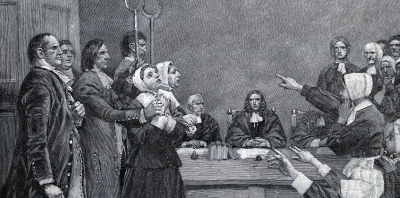Remembering the Salem Witch Trials
On this day in 1692, five women were found guilty of practicing witchcraft in Massachusetts. Their names were Rebecca Nurse, Elizabeth Howe, Sarah Good, Susannah Martin, and Sarah Wildes. Once convicted, these women scarcely had time to react to this traumatic injustice, and no time at all to appeal to the better natures of their persecutors. On the very same day, all five women were hanged until dead.
Image: Bettmann Archive/Getty Images
Prior to being executed, these women, among others falsely accused, were held in torturous conditions, in jails that were damp, crowded, and often disease-ridden. The alleged witches, many of them devoutly religious, were robbed of their dignity; they were stripped of their clothing, examined for ‘witch's marks,’ and ruthlessly interrogated. They were denounced as satanic, immoral, and a danger to their more godly neighbours, both physically and spiritually.
Between February 1692 and May 1693, more than 200 people faced accusations of witchcraft in Massachusetts. The vast majority were women. 20 were executed for their alleged crimes, while several others died in jail while awaiting their trials.
Some of the accused, like Rebecca Nurse, were respected members of their communities. Others, however, were already marginalized, due to being impoverished, racialized, or seen as sexually promiscuous.
Image: Joseph E. Baker Wikimedia Commons (via Library of Congress)
These trials took place against a backdrop of religious Puritanism, deep political tensions, social inequality, and petty feuds over property and influence, and involved the use of spectral evidence — reports of a supposed witch’s apparition appearing before her accuser in dreams or visions.
This imaginary “evidence,” based on superstition, unfounded beliefs, and often malice, was used to persecute innocent people, sending many of them to their deaths.
The Salem witch trials and the far deadlier Early Modern witch craze in Europe were terrible events that illustrate the horrifying and deadly power of social panics fuelled by paranoia, mob mentality, greed, and an irrational fear of difference. On this somber anniversary, let us reflect on the mistakes of the past — and what we can (and must) do to prevent such injustices in our own time.
Your Accursed Librarian,
Valeska



